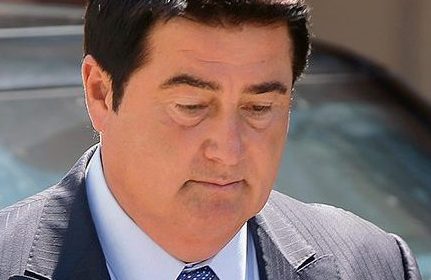Former local developer Michael Liberty was sentenced to four months in prison and fined $100,000 Wednesday in U.S. District Court in Portland for federal campaign finance violations.
Liberty, once one of the most prominent businessmen in Maine, had pleaded guilty in November to violating campaign finance laws in 2011 by using nine family members and employees to contribute $22,500 to a presidential campaign and then reimbursing them, which allowed him to circumvent the $2,500 limit on personal donations. The campaign has not been named, but Liberty personally donated to Republican Mitt Romney during his primary run.
Federal Senior District Judge D. Brock Hornby told Liberty he had committed “the quintessential white-collar crime” and it required “punishment that stings.”
Liberty rose from an impoverished childhood in Gray to financing projects that included the Chandler’s Wharf condominiums on the city’s waterfront and the 100 Middle Street office building, which has tenants that now include the federal prosecutors who asked Hornby to send Liberty to prison Wednesday.
The prosecutors requested a sentence at the low end of federal guidelines, which call for six to 12 months in prison, in keeping with the deal that led to Liberty’s guilty plea. Liberty’s lawyers sought probation that would have allowed him to avoid prison. He could have been fined between $67,500 and $250,000. Neither prosecutors nor Liberty’s lawyers made a recommendation on what financial penalty Liberty’s crime warranted.
Hornby gave Liberty less than a month before starting his prison term, setting Sept. 8 as his reporting date. It’s not clear where Liberty will serve the time, but it likely will be a federal prison near his home in Windemere, Florida. The other likely option would be the nearest federal prison to Maine, in Berlin, New Hampshire. The federal Bureau of Prisons will decide where he goes.
About 35 people, mostly Liberty supporters, were present in the courtroom. Liberty arrived in a black Range Rover SUV about a half hour before the sentencing hearing was to begin and immediately went into a conference room with a half-dozen lawyers.
Four supporters spoke on Liberty’s behalf, telling Hornby that Liberty supported charitable causes, including a foundation for Navy SEALs, as well as individuals he met whose stories resonated with him. One, Abata Reta, is a car service driver who met Liberty in 2009 in Atlanta.
Reta, an immigrant from Ethiopia, said he and Liberty struck up a friendship and the developer eventually gave him $15,000 toward the purchase of a second car for his business – which Reta renamed Liberty Limousine – $120,000 toward college expenses for Reta’s children, $100,000 to buy a house and another $10,000 to help Reta when he was sick.
Others told of Liberty’s generosity through a family foundation he set up, as well as his interest in helping to end global hunger.
But Assistant U.S. Attorney Donald Clark told Hornby that there were plenty of Liberty projects that cost investors millions of dollars. He also noted that Liberty faces major legal problems with the Securities and Exchange Commission in Pennsylvania.
In 2010, Liberty struck a deal with the SEC to settle allegations that he mismanaged an investment fund, and agreed to return nearly $6 million in what the SEC said were improper profits, plus interest. The penalty was cut to $600,000 when Liberty filed documents claiming that he had a net worth of negative $29 million. Regulators now say he lied about his net worth, and the SEC is seeking to have the full penalty restored.
Clark said Liberty did then, and continues now, to “live what can only be described as a lavish lifestyle in Windemere, Florida.”
Clark also made note of Liberty’s supporters in the courtroom, but said “a sentence in federal court is not an election or referendum.”
Hornby seemed to agree, noting that the tales of Liberty’s generosity were impressive, but “good works do not result in a free pass.”
A life story of overcoming hardship to achieve great success “does not give you license to do what you want with (money) in all circumstances,” the judge told Liberty.
Hornby said the nature of Liberty’s crime “taints the integrity of our election process.”
Liberty did not visibly react to the sentence, but he looked glum afterward, then went back into the conference room with his lawyers. He left the courthouse by a back door.
His lawyer, George Marcus, said Liberty would not comment on the sentence.
Liberty was a major figure in Portland in the 1980s and early 1990s, going from largely raising himself as a teen to running a sandwich shop in Gray and then becoming a major developer.
After the Portland real estate market hit a downturn in the early 1990s, Liberty went west and built housing in Colorado and produced movies in Hollywood. He also founded Mozido, a mobile payments processing company, in Texas. The company has attracted millions of dollars from investors, but critics say it hasn’t produced any commercially valuable technology that will allow it to lead in the emerging sector of the financial industry.
Edward D. Murphy can be contacted at 791-6465 or at:
emurphy@pressherald.com
Send questions/comments to the editors.




Success. Please wait for the page to reload. If the page does not reload within 5 seconds, please refresh the page.
Enter your email and password to access comments.
Hi, to comment on stories you must . This profile is in addition to your subscription and website login.
Already have a commenting profile? .
Invalid username/password.
Please check your email to confirm and complete your registration.
Only subscribers are eligible to post comments. Please subscribe or login first for digital access. Here’s why.
Use the form below to reset your password. When you've submitted your account email, we will send an email with a reset code.